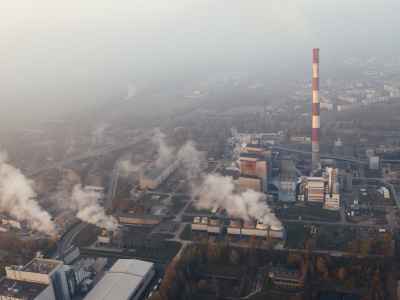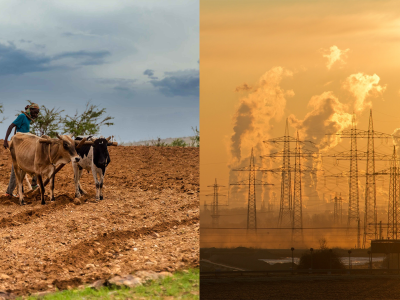
The case for an Africa-Europe trade-climate-development triangle
Authors
The European Union (EU) has been rapidly passing new legislation that connects its climate action to external trade and investment flows. But how this new legislation interacts with and will shape trade and development policies and outcomes in low-income countries, in Africa in particular, is seen by many as an oversight. There is an argument that trade, climate and development discussions need to be connected.
Widening trade-climate-development positions?
The recent surge in EU legislation includes a new Carbon Border Adjustment Mechanism (CBAM) on the back of the European Emissions Trading System (ETS) reform, and new regulations around deforestation and due diligence in value chains. Work on a new Net-Zero Industry Act (NZIA) and a Critical Raw Materials Act (CRMA) is also picking up pace. All of these regulations seek to reposition the EU within a global decarbonisation drive.
At one level, this can be seen as the EU putting its money where its mouth is; bravely risking alienating some partners while encouraging others to lower their carbon consumption and reduce deforestation – all this while securing its own energy transition through access to critical minerals. So far, so coherent, even if the prospect of EU elections in 2024 may also have accelerated the output of legislation.
But this positive interpretation of the EU's recent action is not necessarily shared. Even if the effects of climate change are surely being felt, the Africa Group at the World Trade Organization (WTO) recently voiced frustration at trade policy being used for climate issues, or perhaps even to protect EU competitiveness in the name of climate change. It reiterates the point that the world's polluters should be the ones footing the bill, not developing countries.
But this positive interpretation of the EU's recent action is not necessarily shared.
The fact that the EU's call to phase out all fossil fuels at COP27 was followed by a temporary spike in coal imports – coal exports from South Africa to the EU reportedly surged by 582.7% over January to September 2023 compared to the same period in 2022 – contributes to the sense that the EU and other Western actors are "selfish, self-satisfied and insincere". That this was only a temporary shift and “a minor ripple in coal power amid a huge wave of support for renewables” is not at the forefront of this narrative.
Further, the surge in EU external 'green transition' measures seems to stand in contrast to current African discussions on economic transformation and development. As the EU and the US are seeking to decarbonise their energy systems and industries, while vying with China for technological advantage and resource access, African governments are promoting industrialisation through regional value chains by implementing the African Continental Free Trade Area (AfCFTA). Keeping carbon emissions in check, or prioritising renewable energy over fossil fuels, is generally a secondary consideration, and in some cases seen as a threat to industrialisation objectives.
Although the recent summit between the African Union (AU) and regional economic communities (RECs) discussed various reports on climate change and the blue economy, the focus was on AfCFTA implementation, negotiations on the rules of origin for the textile and automotive sectors, and trading under the 'Guided Trade Initiative’ pilot.
African and European positions on climate, trade and development therefore seem far apart. At the same time, many – if not all – of the EU's climate policies will affect African economic ambitions, whether 'green' or not, and thus will demand a response that somehow aligns with Africa’s industrialisation and trade objectives.
A forum to discuss CBAM and other instruments?
In a new podcast, we sit down with Pascal Lamy and Genevieve Pons of Europe Jacques Delors to discuss these issues, and particularly their take on development as the missing side of the triangle with trade and environment. As they underline, there are fora for discussing trade and development, and trade and the environment – at the WTO for instance there is a committee on trade and environment and one on trade and development – but there is no clear forum for discussing the three together. The WTO Africa Group communication also seems to recognise this and pushes for more discussion on the development impacts of trade-related environmental measures.
A major source of frustration is the EU’s unilateral adoption of measures such as the CBAM. While driven by the threat of a crumbling majority in favour of the European Green Deal, the ‘fait accompli’ approach to EU external trade measures has led to a general distrust of the EU’s climate diplomacy.
There are fora for discussing trade and development, and trade and the environment, but there is no clear forum for discussing the three together.
As Pascal Lamy puts it in our conversation, "the EU is not good at green diplomacy" – a point also made in recent ECDPM work on climate diplomacy and the run-up to the COP27. Yet part of the problem also relates to how the CBAM was designed. Rather than being an exclusively external trade, development or climate instrument, the CBAM has been led by the European Commission’s Directorate-General for Taxation and Customs Union with a more technical and arguably internally-focused mandate.
In the EU’s reading, the main objective of the CBAM is to avoid 'carbon leakage'. This is a risk as the EU phases out free emissions allowances for its own industries under the ETS, which will raise the price of carbon in Europe. That could create an unfair market advantage for imported carbon-intensive goods that are not subject to a similar carbon price in producing countries.
With the CBAM, the EU also hopes to create an incentive for others to adopt equivalent carbon pricing to the ETS, making carbon price paid at the source deductible from the cost of future CBAM certificates. The EU also realises that there is no precedent for what it is introducing, and that the system will need to be built on existing capabilities.
The process laid out in the implementation regulation seeks to be flexible by building on the methods used during the first reporting phase and adaptive by allowing a transition phase in which importers will not have to buy CBAM certificates but simply report carbon content. It also aims to adopt a learning approach, where several aspects of exactly how firms should report are left open.
While that all seems positive, the seemingly valid criticism is that there was very little, if any, prior consultation. And, as the Africa Group notes, it may have a heavy export impact for some countries, with little carbon impact overall. Lamy and Pons suggest that a ‘triangle forum’ might have allowed for better discussion and consultation in advance, and allow some concrete discussion on introducing more flexibility for low-income countries.
Looking for trade-environment-development opportunities
But even if the EU’s trade and climate policy activity seems rushed, unconsidered and self-centred, it seems likely that business as usual through ‘brown industrialisation' will imply missing out on future investment and economic opportunities. Despite political and even economic benefits in the short term, in the longer run these seem unlikely to pay off, as a recent study on green industrialisation in the Southern African Development Community (SADC) points out.
Looking more positively, there may even be 'green windows of opportunity' for late industrialisers, while there are examples of some African countries taking the lead. Though often related to natural conditions (for instance, Kenya's high reliance on renewable energy), the ability to take advantage of these will not be automatic, requiring increasing attention to 'green industrial policy'. In our podcast, we touch on the case of Mozambique, a country that is heavily reliant on aluminium exports to the EU. Although the CBAM could negatively affect these, it could also help make a case for greater hydro-electric investment.
This links back to the ‘missing piece of the triangle’. CBAM is designed as a narrow, single issue measure, but the EU could accompany the establishment of a carbon border tax with specific support to help affected countries adapt and take advantage of emerging niche green export markets.
The case of Mozambique raises questions about how African economies will respond to a greener global marketplace. Although there are an increasing number of African green development strategies at the national and regional levels, so far the issue has remained marginal at best in the first implementation steps of the AfCFTA.
Prioritising the AfCFTA perhaps makes sense, as it has yet to achieve full implementation – but ignoring the wider ‘green economy’ entails risks for the future.
Prioritising the AfCFTA perhaps makes sense, as it has yet to achieve full implementation – but ignoring the wider ‘green economy’ entails risks for the future. In the Democratic Republic of the Congo (DRC) and Zambia, there are discussions on taking advantage of critical raw materials to attract investment into electric vehicle battery manufacturing. Multiple countries have developed hydrogen economy strategies to supply future global markets for hydrogen and its derivatives.
But while some countries, including Morocco, Egypt and Kenya, are able to secure investments and start pilot projects, on a continental scale, the green industrialisation drive seems to be limited to general statements of intent. Furthermore, while industrialisation efforts worldwide are often linked to the ability of countries to work together and leverage respective (natural) assets, infrastructure and capabilities, most African greening efforts are only very indirectly linked to the AfCFTA.
Overall, the suggestion for a trade-climate-development triangle forum is welcome. Whether in Geneva or Brussels, or perhaps even Addis Ababa or Accra, linking thinking and discussions around Africa-Europe relations on trade, climate and development looks increasingly important for maintaining constructive diplomatic relations.
The views are those of the author and not necessarily those of ECDPM.






